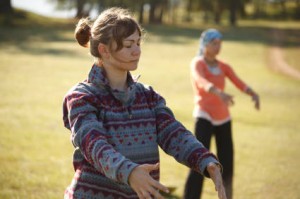
“With Qigong, we’re dealing with subtle energies: Energy medicine. Many feel it is the medicine of the future.”
–Medical Qigong, Wellness Directory of Minnesota
Qigong is Energy Medicine
Dr. James Oschman on Energy Medicine
Highlights from Dr. James Oschman’s presentation at the Annual World Congress of Anti-Aging Medicine. Dr. Oschman believes that a new milestone in medicine is upon us, harnessing the diagnostic and therapeutic use of energy. This new technology which is entering mainstream medical use stimulates the repair and regeneration of tissues.
Denying the ‘direct electromagnetic interactions [among] living molecules would be to deny the fundamental reaction upon which all life depends, namely the absorption of sunlight by green plants.’ James Oschman in Energy Medicine – The Scientific Basis other information by the Qigong Institute promoting qigong and energy medicine through research and education.
Qigong Benefits Immune Function in Cancer Patients By Lynne Eldridge Some cancer centers offer qigong in addition to conventional medical treatments to help with the symptoms of cancer. In this setting, qigong is not used as a treatment for cancer perse, but as a method of easing cancer symptoms such as fatigue. Recent studies suggest that qigong may improve quality of life for people living with cancer.
In the U.S., numerous abstracts on the positive aspects of Medical Qigong by the University of Minnesota and the Mayo Clinic have been published by the World Scientific Publishing Company, Institute for Advanced Research in Asian Science and Medicine.
Additional abstracts have been written and medical research has been conducted regarding a wide range of health issues, for example:
• Diabetes • Sports Injuries • Neurological • Cancer • Hypertension • Autism • Chronic Pain • Fibromyalgia • Brain Injuries • Cognitive Function • Chronic Fatigue Syndrome • COPD and Asthma • Drug & Alcohol Addictions • Trauma • Aging and Balance • Arthritis • Menopause and Bone Density • Insomnia • Rheumatism • Hormonal and Metabolic • Disease Prevention • Neck and Back Pain • Cardiovascular/Circulatory • Quality of Life • Parkinson’s • Depression and Anxiety • Many Others
Participating institutions include, to name a few: Harvard Osher Research Center, Harvard Medical School; University of Colorado School of Medicine, Denver; Department of Psychology, Stanford University; Orebro University, Sweden; Gustavus Adolphus College, Waseca, MN; Institute of Social Medicine, Epidemiology, and Health Economics, Charite University Medical Center, Berlin, Germany; Virginia Integrative Medicine, Charlottesville, VA; Sydney Medical School, University of Sydney, Royal Prince Alfred Hospital & Concord Repatriation General Hospital, Sydney, Australia; Wegmans School of Nursing, St. John Fisher College, Rochester, NY; Montana State University; Western Oregon University; University of East Anglia, Norfolk, UK; Arizona State University; University of Malaga, Spain; Universities of Exeter and Plymouth, UK; Department of Kinesiology and Community Health, University of Illinois, Urbana-Champaign, IL; Tokyo Kita Shakai Hoken Hospital; Winship Cancer Institute, Atlanta, and numerous others.
*Information compiled by Tai Chi Association of Colorado Springs. These studies on Tai Chi and Qigong do not imply an endorsement by these institutions as to the cure of the above diseases and disorders. Contact your medical practitioner first for any health issues.
Download this report: Health Benefits of Tai Chi


